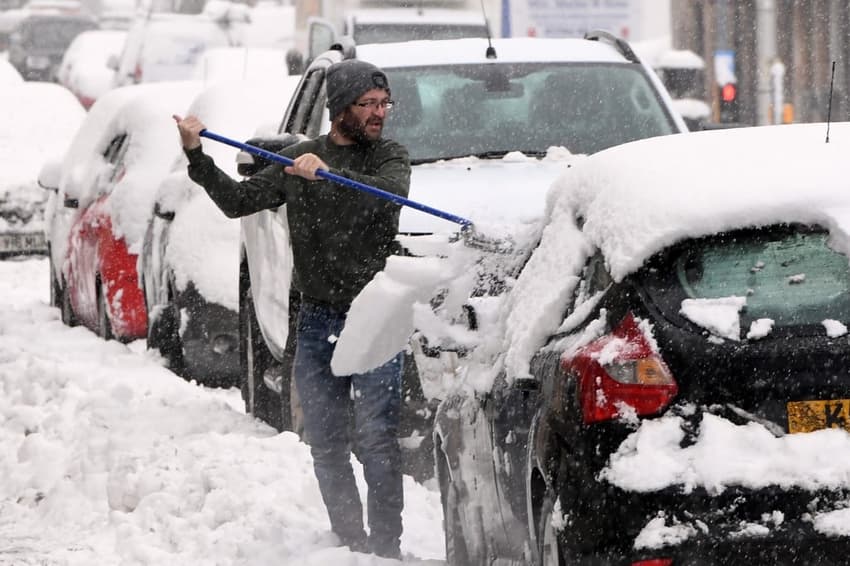The three important Swiss driving rules for when it snows

Winter driving in Switzerland can be hazardous if your vehicle is not properly equipped. Here is what you should know before you drive in snowy weather.
This information comes from Touring Club Suisse (TCS), the largest motoring organisation in Switzerland.
There is no legal obligation to outfit your car with winter tyres, but...
This is a contradiction of sorts because while the law doesn’t require winter tyres, it states that the driver must be able to maintain control of the vehicle at all times and in all circumstances, and the car must be adapted to the weather conditions.
If you choose not to put on winter tyres and get into an accident, your insurance could reduce your compensation — or refuse to pay for the damages altogether.
And in the event that the accident was your fault, the insurance company can even claim against you for negligence.
If you do use winter tyres, keep in mind that the minimum tread required by law is 1.6 mm, but 4 mm is recommended.
READ ALSO: When should you change to winter tyres?
If there’s snow and ice on mountain roads, your car must be fitted with chains
However, you are obligated to put on chains only when there are signs marked "Mandatory snow chains." The chains must allow starting, braking and lateral guidance on snow and ice.
It is recommended to chain at least two of the driving wheels on the same axle and never exceed the speed of 50 km / h.
Failure to comply with the obligation to use snow chains when're it is required to do so could cost you 100 francs.
Remove snow and ice from the car before hitting the road
This should be self-evident, yet many drivers neglect to thoroughly clear the snow from the roof and hood, and defrost their windshield, windows, mirrors, and headlights, to ensure optimum visibility.
Snow falling from the roof while you drive represents a danger not only for yourself, but for the other vehicles on the road as well, and you could be fined 200 francs if stopped by police while driving a car.
But in a typical Swiss fashion, you can’t use just any products to de-ice the car, as the government specifies they must “respect the environment”.
The Federal Office for the Environment lists the ingredients that should be used for defrosting purposes — and ones that shouldn't.
READ MORE: Six Swiss driving rules you may not know about — but should
Comments
See Also
This information comes from Touring Club Suisse (TCS), the largest motoring organisation in Switzerland.
There is no legal obligation to outfit your car with winter tyres, but...
This is a contradiction of sorts because while the law doesn’t require winter tyres, it states that the driver must be able to maintain control of the vehicle at all times and in all circumstances, and the car must be adapted to the weather conditions.
If you choose not to put on winter tyres and get into an accident, your insurance could reduce your compensation — or refuse to pay for the damages altogether.
And in the event that the accident was your fault, the insurance company can even claim against you for negligence.
If you do use winter tyres, keep in mind that the minimum tread required by law is 1.6 mm, but 4 mm is recommended.
READ ALSO: When should you change to winter tyres?
If there’s snow and ice on mountain roads, your car must be fitted with chains
However, you are obligated to put on chains only when there are signs marked "Mandatory snow chains." The chains must allow starting, braking and lateral guidance on snow and ice.
It is recommended to chain at least two of the driving wheels on the same axle and never exceed the speed of 50 km / h.
Failure to comply with the obligation to use snow chains when're it is required to do so could cost you 100 francs.
Remove snow and ice from the car before hitting the road
This should be self-evident, yet many drivers neglect to thoroughly clear the snow from the roof and hood, and defrost their windshield, windows, mirrors, and headlights, to ensure optimum visibility.
Snow falling from the roof while you drive represents a danger not only for yourself, but for the other vehicles on the road as well, and you could be fined 200 francs if stopped by police while driving a car.
But in a typical Swiss fashion, you can’t use just any products to de-ice the car, as the government specifies they must “respect the environment”.
The Federal Office for the Environment lists the ingredients that should be used for defrosting purposes — and ones that shouldn't.
READ MORE: Six Swiss driving rules you may not know about — but should
Join the conversation in our comments section below. Share your own views and experience and if you have a question or suggestion for our journalists then email us at [email protected].
Please keep comments civil, constructive and on topic – and make sure to read our terms of use before getting involved.
Please log in here to leave a comment.